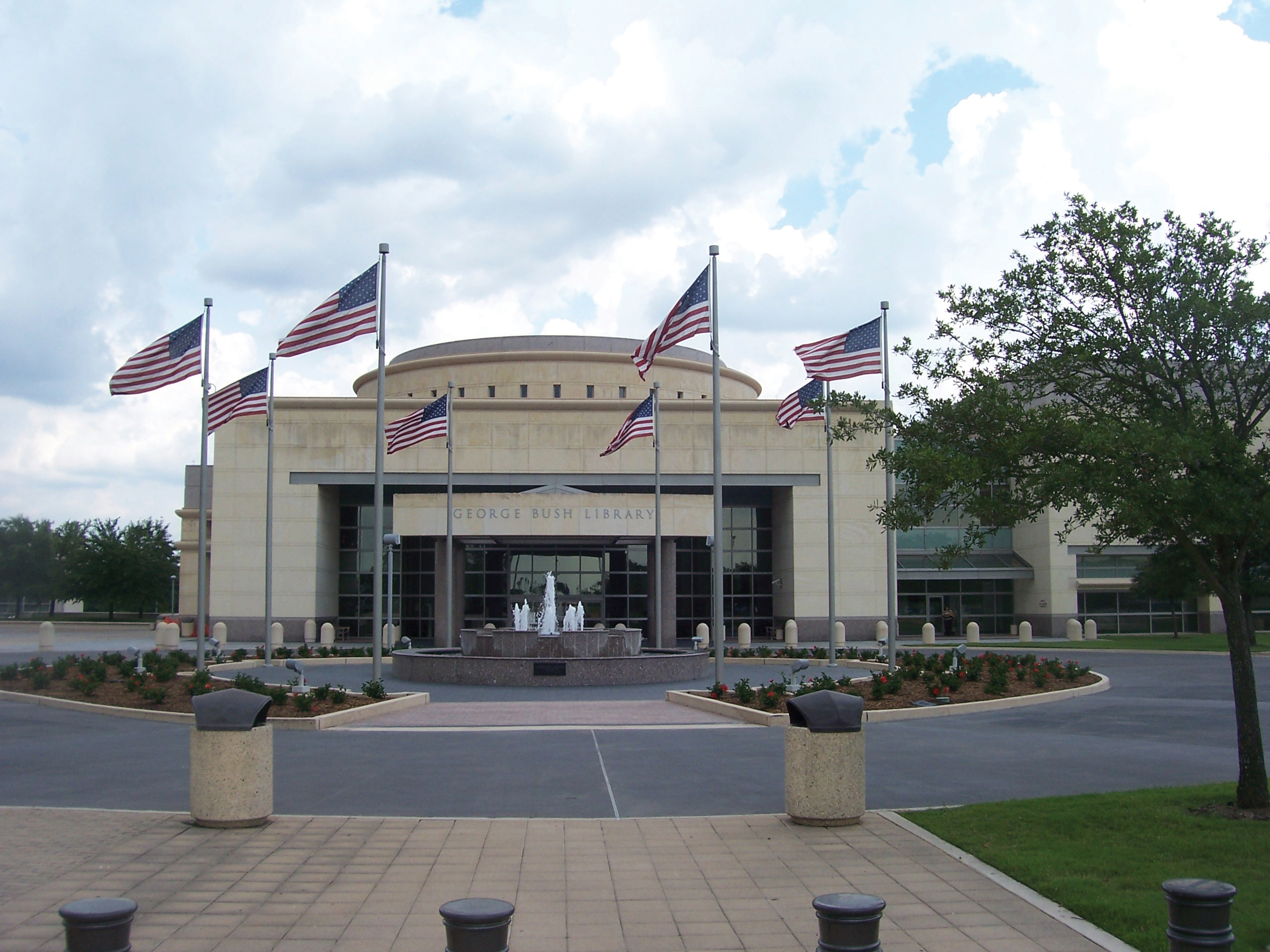Roof leaks can be a museum’s worst enemy, threatening water damage to artifacts and disturbing delicately controlled indoor environments. That’s why an $8.3 million renovation to the core exhibits at the George H.W. Bush Presidential Library and Museum in 2007 was done in parallel with fixing approximately 75,000-sf of the flat, spray-applied polyurethane foam (SPF) roof that had provided almost 10 years of service.
“We were redoing the core exhibit so I thought it was a good time to check the roof,” explains Robert Spacek, Facility Operations Specialist for the George H.W. Bush Presidential Library and Museum.
The original roof was a foam and silicone-coated system. Although SPF roofs can often last 20 years or more, and are renewable indefinitely with simple recoats every 10-15 years, this one was showing some wear and tear. As part of the renovation, there was talk of tearing off the existing roof and replacing it with another solution. This option, however, would be extremely expensive and time-consuming. Plus, the artifacts and records would have had to be moved and the building closed to the public during renovations.
“This particular roof was still in excellent shape and performing well. There was nothing wrong with the base foam roofing insulation,” explains John Austin, Vice President of Spray Polyurethane Foam and Coatings for F.W. Walton Inc., the contractor on the project. “But there were some leaks related to the rotunda and control joints in the windows, and membrane repairs were ineffective to prevent those roof leaks.”
Spacek made a request to the National Archives and Records Administration (NARA) for funding for the roofing project. The NARA architects were subsequently asked to research the cost of replacing the entire roof. After consulting with BASF technical experts, it was discovered that only certain parts needed minor repairs, so a tear-off and replacement could be avoided.
Once the project was approved, the bid went to Houston-based F.W. Walton, Inc. Having found the root of the problem, Austin used ELASTOSPRAY SPF from BASF to perform minor repairs on various parts of the existing roof, followed by a recoat of the entire roof to provide a consistent and fresh aesthetic appeal. This renewal would continue to deliver on the energy savings inherent in SPF roofing systems, prolong the life expectancy of the original roof and provide a quick installation with minimal disruption. All at a far reduced cost compared with a tear off and replacement. Plus, it would divert a lot of waste from landfills.
For more information, contact:
BASF Corporation
100 Park Avenue
Florham Park, NJ 07932
info@basfconstruction.us
construction.basf.us
And thanks to the decision to repair and recoat the original roof, the work didn’t inconvenience the public or expose artifacts to the elements.
“We didn’t have to change anything,” says Spacek, who adds that it was his first big job with this type of roofing system. “Things went really well. The contractor was very easy to get along with. In all honesty, I didn’t understand a lot about this stuff until I started this job. I am very pleased with the results. It has been a very satisfactory experience for me.” +
Related Stories
Multifamily Housing | Jun 28, 2023
Sutton Tower, an 80-story multifamily development, completes construction in Manhattan’s Midtown East
In Manhattan’s Midtown East, the construction of Sutton Tower, an 80-story residential building, has been completed. Located in the Sutton Place neighborhood, the tower offers 120 for-sale residences, with the first move-ins scheduled for this summer. The project was designed by Thomas Juul-Hansen and developed by Gamma Real Estate and JVP Management. Lendlease, the general contractor, started construction in 2018.
Architects | Jun 27, 2023
Why architects need to think like developers, with JZA Architecture's Jeff Zbikowski
Jeff Zbikowski, Principal and Founder of Los Angeles-based JZA Architecture, discusses the benefits of having a developer’s mindset when working with clients, and why architecture firms lose out when they don’t have a thorough understanding of real estate regulations and challenges.
Apartments | Jun 27, 2023
Average U.S. apartment rent reached all-time high in May, at $1,716
Multifamily rents continued to increase through the first half of 2023, despite challenges for the sector and continuing economic uncertainty. But job growth has remained robust and new households keep forming, creating apartment demand and ongoing rent growth. The average U.S. apartment rent reached an all-time high of $1,716 in May.
Apartments | Jun 27, 2023
Dallas high-rise multifamily tower is first in state to receive WELL Gold certification
HALL Arts Residences, 28-story luxury residential high-rise in the Dallas Arts District, recently became the first high-rise multifamily tower in Texas to receive WELL Gold Certification, a designation issued by the International WELL Building Institute. The HKS-designed condominium tower was designed with numerous wellness details.
University Buildings | Jun 26, 2023
Addition by subtraction: The value of open space on higher education campuses
Creating a meaningful academic and student life experience on university and college campuses does not always mean adding a new building. A new or resurrected campus quad, recreational fields, gardens, and other greenspaces can tie a campus together, writes Sean Rosebrugh, AIA, LEED AP, HMC Architects' Higher Education Practice Leader.
Standards | Jun 26, 2023
New Wi-Fi standard boosts indoor navigation, tracking accuracy in buildings
The recently released Wi-Fi standard, IEEE 802.11az enables more refined and accurate indoor location capabilities. As technology manufacturers incorporate the new standard in various devices, it will enable buildings, including malls, arenas, and stadiums, to provide new wayfinding and tracking features.
Green | Jun 26, 2023
Federal government will spend $30 million on novel green building technologies
The U.S. General Services Administration (GSA), and the U.S. Department of Energy (DOE) will invest $30 million from the Inflation Reduction Act to increase the sustainability of federal buildings by testing novel technologies. The vehicle for that effort, the Green Proving Ground (GPG) program, will invest in American-made technologies to help increase federal electric vehicle supply equipment, protect air quality, reduce climate pollution, and enhance building performance.
Office Buildings | Jun 26, 2023
Electric vehicle chargers are top priority for corporate office renters
Businesses that rent office space view electric vehicle (EV) charging stations as a top priority. More than 40% of companies in the Americas and EMEA (Europe, the Middle East and Africa) are looking to include EV charging stations in future leases, according to JLL’s 2023 Responsible Real Estate study.
Laboratories | Jun 23, 2023
A New Jersey development represents the state’s largest-ever investment in life sciences and medical education
In New Brunswick, N.J., a life sciences development that’s now underway aims to bring together academics and researchers to work, learn, and experiment under one roof. HELIX Health + Life Science Exchange is an innovation district under development on a four-acre downtown site. At $731 million, HELIX, which will be built in three phases, represents New Jersey’s largest-ever investment in life sciences and medical education, according to a press statement.
Sports and Recreational Facilities | Jun 22, 2023
NFL's Jacksonville Jaguars release conceptual designs for ‘stadium of the future’
Designed by HOK, the Stadium of the Future intends to meet the evolving needs of all stadium stakeholders—which include the Jaguars, the annual Florida-Georgia college football game, the TaxSlayer.com Gator Bowl, international sporting events, music festivals and tours, and the thousands of fans and guests who attend each event.

















